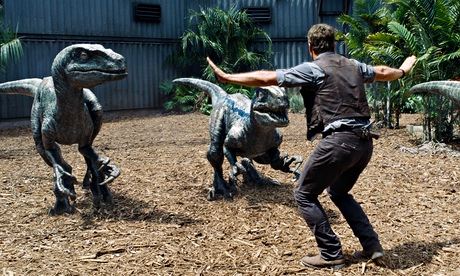
One inevitability of Jurassic World’s monster success is the speed with which it will spawn – not just its own sequels, but lookalike knock-offs too. First up is Meg, a disaster movie announced on Monday about a 70ft, 20 tonne deep-sea beastie, Carcharodon megalodon, who suddenly pops up after 16 million years’ absence, ever so hungry, in the Pacific. Eli Roth will adapt Steve Altman’s thriller; should the film prove a success, follow-up books – including Meg: Origins; Meg: Primal Waters; and Meg: Hell’s Aquarium – offer franchise potential.
When Michael Crichton first had the idea that people might clone dinosaurs, he demanded $1.5m upfront from Steven Spielberg before he’d get cracking on the novel that would be turned into a movie that was, for a while, the highest-grossing of all time. For the likes of Meg, no such genius seed is necessary. The concept is simply that a big fish presumed lost to history wasn’t, in fact – like a set of keys that turns up behind the sofa, or some burnt onions that are just about about edible after all.
I’d always assumed dinosaur movies are such reliable cash cows because they’re family-friendly. The threat at their centre is, in the real world, pretty negligible. You could legitimately worry about cannibals or killer sharks or even poltergeists. But only the youngest among us would fret about something that’s extinct?
Wrong. A friend on Facebook has asked people not to post about Jurassic World on account of her dino-phobia. She’s serious. Yet humans and dinosaurs never coexisted; there can be no hardwired evolutionary memory such as that which programmes us to move aside should a sabre-toothed tiger come round the corner.
Such an irrational reaction, then, is a fantastic coup for cinema – great testimony to the power of movies to make the real unreal, to capture the imaginary. It also bodes well for Meg: Hell’s Aquarium.
The garden of Franzen
On Tuesday Lonely Planet voted Kent its top choice as a family holiday destination. The guide cited the regenerated retro charms of Margate, and the posh caffs of Whitstable.
Kent would also, I’d suggest, be a good vacation tip for Jonathan Franzen. Not only is there lots of birdwatching, but trips to Rochester and Broadstairs, to the marshes at Hoo and the church at Cooling, would help sate a Charles Dickens fixation that reaches giddy new heights in his new novel, Purity.
The heroine of that book is Pip. She’s an almost-orphan with a Havisham-ish mother and deep need of a benefactor. There’s a fugitive from justice who has committed a compassionate crime, much melodramatic coincidence, and a defence of the sort of long-form, socially conscious journalism that led to work such as Great Expectations in the first place. The biggest novel of the year has its roots firmly in the garden of England. Visit Kent should be thrilled.
Fantasy fancies
Recent discussion of Kristen Stewart, the actor whose mother may or may not have confirmed her bisexuality, has been accompanied by clapping and tutting – but not a lot of self-examination. Some say that the media has revealed its essential prejudice in its coverage; others accuse avaricious studios of stopping gay stars from coming out.
Actually, such issues begin and end with us, the audience. Studios cater for markets; newspapers too. As witnessed at the time of George Clooney’s engagement, it appears many of us assume that if we fall into the broad category of people a movie star could fancy, they’re more likely to fall into bed with us. Yet such odds remain sadly slight. There is almost more chance of dinosaurs roaming the earth once more than Stewart sleeping with you, regardless of gender.
Until our own egos can learn to cope with this, neither stars nor studios should be blamed for seeking to placate us.

